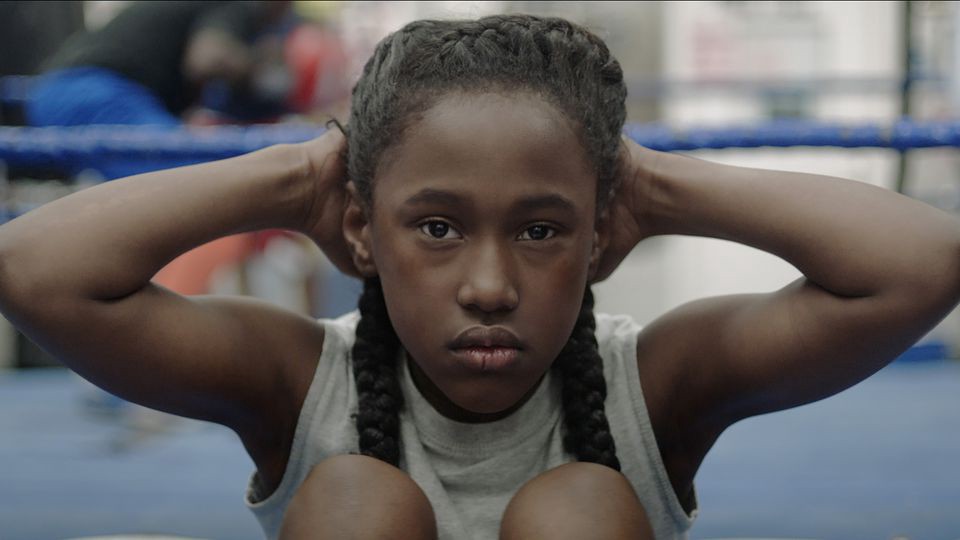Anna Rose Holmer was listed as one of Filmmaker Magazine’s “25 New Faces of Independent Film 2015.” She recently produced Jody Lee Lipes’ “Ballet 422” and Mike Plunkett’s “Salero.” With filmmaker Matt Wolf, Holmer co-directed and produced “A Ballet in Sneakers: Jerome Robbins and Opus Jazz,” a companion documentary to “NY Export: Opus Jazz,” which aired on the PBS series “Great Performances: Dance in America.” Holmer’s first documentary feature, “Twelve Ways to Sunday,” was one of 10 films to participate in IFP’s 2009 Documentary Filmmaker Lab and premiered with Rooftop Films in 2010. “The Fits” is her narrative directorial debut.
“The Fits” opens in NY June 3 and LA June 10, with a national rollout to follow.
W&H: Describe the film for us in your own words.
ARH: “The Fits” is a genre-blending dance film about our individual and collective identities as experienced from the perspective of an 11-year-old girl named Toni.
W&H: What drew you to this story?
ARH: Researching real cases of hysteria and mass psychogenic illness provided the first spark of inspiration. Re-imagining those subconscious movements as “choreographies” created the foundation of the film.
W&H: What do you want people to think about when they are leaving the theater?
ARH: I hope audiences think about situations when the power of a team can actually elevate our individual potentials. One’s desire to be part of a group should not be conflated with conformity. Filmmaking is a perfect example of what we can achieve through collaborative thinking and collective action.
I also hope people leave the theater thinking back on moments of transcendence in their own lives — those out-of-body experiences that felt like a dream.
W&H: What was the biggest challenge in making the film?
ARH: So many elements of our process were simultaneously challenging and constructive. We only had eleven months from our first full draft of the film to our World Premiere at the Venice International Film Festival, so the pressure of working at that pace was a huge task.
We really felt the stress of those constraints in our post-production schedule. However, I think that timeline forced us to constantly make concrete and bold choices that live on screen. In the end, I’m grateful we made the film this way.
W&H: How did you get your film funded? Share some insights into how you got the film made.
ARH: “The Fits” was produced and financed through a grant from the Venice Biennale Cinema College Fund, a micro-budget and micro-timeline initiative for first- and second-time filmmakers from around the world.
After Venice, we secured grants from the Sundance Institute, Cinereach, and Rooftop Films to prepare for the Sundance Film Festival and distribution.
W&H: Your film really benefited from its Sundance debut and has built on the momentum. Talk about negotiating the deal for the release and share tips for other women directors who might be in that place in the future.
ARH: Our sales agent Charlotte Mickie and her team at Mongrel International came on board right after our World Premiere at Venice and we really trusted her guidance and expertise when thinking about marketplace positioning. Because this was an entirely grant-funded project, we had different obligations and considerations in terms of deal-making.
For this film, we wanted a distribution partner who was really going to take a hands-on approach and include us in the process. Making that decision outside of the insanity of a festival was healthier for our small team. We decided on Oscilloscope right before Sundance and that announcement actually gave us press momentum heading into the festival.
We also received an amazing grant from Rooftop Films to work with Brigade for publicity during Sundance, and that had a huge impact on what we were able to accomplish during the week.
Ultimately, having both a sales agent and publicist that really understood the film we made and our goals for its life was key in connecting to like-minded distributors and finding champions during its festival run.
W&H: What’s the best and worst advice you’ve received?
ARH: I honestly can’t remember any bad advice: I don’t keep that in my mind-storage. Best advice? Focus on breath.
W&H: What advice do you have for other female directors?
ARH: Trust your gut. Be generous. Make gratitude a daily practice.
W&H: Name your favorite woman-directed film and why.
ARH: Andrea Arnold’s “Fish Tank” is pretty high up there for me. From the claustrophobic but human-centric 4:3 aspect ratio, to her casting choices, her directing style is about intense, palpable realism. I remember feeling a rush of life the first time I watched it.







